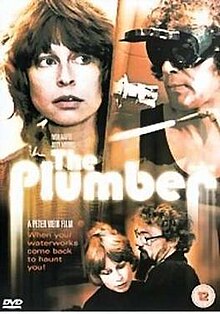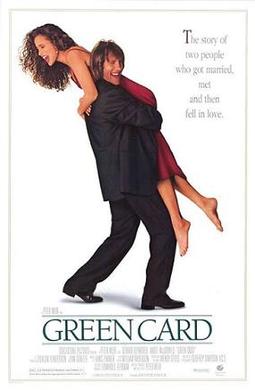
Green Card is a 1990 American romantic comedy-drama film written, produced, and directed by Peter Weir and starring Gérard Depardieu and Andie MacDowell. The screenplay focuses on an American woman who enters into a marriage of convenience with a Frenchman so he can obtain a green card and remain in the United States. Depardieu won the Golden Globe Award for Best Actor. The film won the Golden Globe for Best Motion Picture – Musical or Comedy, and was nominated for an Oscar for Best Original Screenplay.

Peter Lindsay Weir is an Australian retired film director. He is known for directing films crossing various genres over forty years with films such as Picnic at Hanging Rock (1975), Gallipoli (1981), Witness (1985), Dead Poets Society (1989), Fearless (1993), The Truman Show (1998), Master and Commander: The Far Side of the World (2003), and The Way Back (2010). He has received six Academy Award nominations, ultimately being awarded the Academy Honorary Award in 2022 for his lifetime achievement career.
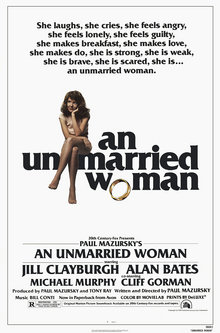
An Unmarried Woman is a 1978 American romantic comedy-drama film written and directed by Paul Mazursky and starring Jill Clayburgh, Alan Bates, Michael Murphy, and Cliff Gorman. The film was nominated for three Academy Awards: Best Picture, Best Original Screenplay, and Best Actress (Clayburgh).

Jill Clayburgh was an American actress known for her work in theater, television, and cinema. She received the Cannes Film Festival Award for Best Actress and was nominated for the Academy Award for Best Actress for her breakthrough role in Paul Mazursky's comedy drama An Unmarried Woman (1978). She also received a second consecutive Academy Award nomination for Starting Over (1979) as well as four Golden Globe nominations for her film performances.

Judith Davis is an Australian actress in film, television, and on stage. With a career spanning over 40 years, she has been commended for her versatility and regarded as one of the finest actresses of her generation. Frequent collaborator Woody Allen described her as "one of the most exciting actresses in the world". She is the most awarded recipient for the AACTA Award with nine accolades and has received numerous accolades, including three Emmy Awards, two BAFTA Awards, and two Golden Globe Awards, and two nominations for Academy Awards.
The Nimrod Theatre Company, commonly known as The Nimrod, was an Australian theatre company based in Sydney. It was founded by in 1970 by Australian actors John Bell, Richard Wherrett and Ken Horler, and gained a reputation for producing more "good new Australian drama" from 1970 to 1985 than any other Australian theatre company.

Celebrity is a 1998 American comedy-drama film written and directed by Woody Allen, and features an ensemble cast. The screenplay describes the divergent paths a couple takes following their divorce.

Richard Samuel Benjamin is an American actor and film director. He has starred in a number of well-known films, including Goodbye, Columbus (1969), based on the novella by Philip Roth; Catch-22 (1970), from the Joseph Heller best-seller; Westworld (1973), a science-fiction thriller by Michael Crichton; and The Sunshine Boys (1975), written by Neil Simon, for which he won the Golden Globe Award for Best Supporting Actor. He was nominated for an Emmy Award for Best Actor in a Comedy Series for his work on He & She (1968), opposite his wife Paula Prentiss.
The Australian New Wave was an era of resurgence in worldwide popularity of Australian cinema, particularly in the United States. It began in the early 1970s and lasted until the mid-late 1980s. The era also marked the emergence of Ozploitation, a film genre characterised by the exploitation of colloquial Australian culture.

Michael Lembeck is an American actor and television and film director. He is best known as Max Horvath in One Day at a Time (1979–1984).
Ivar Kants is an Australian actor of Latvian descent who has played numerous roles in soap operas including A Country Practice, G.P., All Saints, Water Rats, and Blue Heelers. He portrayed the role of Ken Garrett in the soap opera The Restless Years (1979) and starred as Father Menotti, a caring inner-city parish priest in the 1980–81 TV series Menotti.
Bellamy was an Australian television series made by the Reg Grundy Organisation for the Ten Network in 1981.
Judith Ann Morris is an Australian character actress, as well as a film director and screenwriter, well known for the variety of roles she played in 58 different television shows and films, starting her career as a child actress and appearing on screen until 1999, since then she has worked on film writing and directing, most recently for co-writing and co-directing a musical epic about the life of penguins in Antarctica which became Happy Feet, Australia's largest animated film project to date.

Dead End Drive-In is a 1986 Australian dystopian action film about a teenage couple trapped in a drive-in theatre which is really a concentration camp for societal rejects. The inmates, many of whom sport punk fashion, are placated with a steady diet of junk food, new wave music, drugs, and exploitation films. The film was directed by Brian Trenchard-Smith and stars Ned Manning and Natalie McCurry as the captive couple, and Peter Whitford as the manager of the drive-in. Mad Max 2 stuntman Guy Norris did some of the stunts. The soundtrack includes contemporary popular music performed by such bands as Kids in the Kitchen and Hunters and Collectors. The song during the rolling credits is "Playing With Fire" by Lisa Edwards.
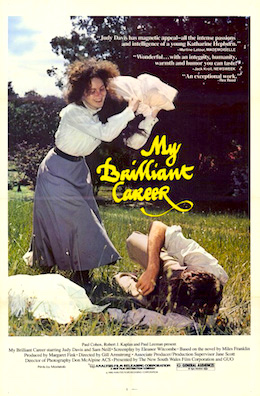
My Brilliant Career is a 1979 Australian period drama film directed by Gillian Armstrong, and starring Judy Davis, Sam Neill, and Wendy Hughes. Based on the 1901 novel of the same name by Miles Franklin, it follows a young woman in rural, late-19th-century Australia whose aspirations to become a writer are impeded first by her social circumstance, and later by a budding romance.
Ozploitation films are exploitation films – a category of low-budget horror, comedy, sexploitation and action films – made in Australia after the introduction of the R rating in 1971. The year also marked the beginnings of the Australian New Wave movement, and the Ozploitation style peaked within the same time frame.
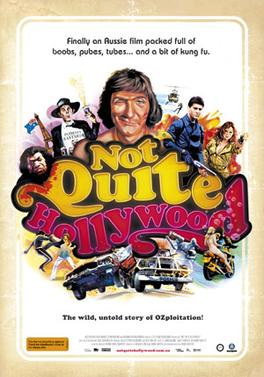
Not Quite Hollywood: The Wild, Untold Story of Ozploitation! is a 2008 Australian documentary film about the Australian New Wave of 1970s and 1980s low-budget cinema. The film was written and directed by Mark Hartley, who interviewed over eighty Australian, American and British actors, directors, screenwriters and producers, including Quentin Tarantino, Brian Trenchard-Smith, Jamie Lee Curtis, Dennis Hopper, George Lazenby, George Miller, Barry Humphries, Stacy Keach, John Seale and Roger Ward.

The Man from Hong Kong, originally released in the US as The Dragon Flies, is a 1975 action film written and directed by Brian Trenchard-Smith in his directorial debut and starring Jimmy Wang Yu and George Lazenby, with Hugh Keays-Byrne, Roger Ward, Rosalind Speirs, Rebecca Gilling, Sammo Hung, Grant Page and Frank Thring in supporting roles. The first film to be made as an international coproduction between Australia and Hong Kong, it serves as a satire of the James Bond and Dirty Harry franchises, combined with tropes of the concurrent chopsocky craze. Its plot follows Inspector Fang Sing Leng (Wang) of the RHKPF's Special Branch, who travels to Sydney to perform an extradition, only to find himself locked in battle with Jack Wilton (Lazenby), the city's most powerful crime lord.

Dawn! is a 1979 Australian sports biopic about the three-time Olympic gold medallist swimmer Dawn Fraser, who served as technical adviser for the production, it starring Bronwyn Mackay Payne and Bunney Brooke, written by Joy Cavill and directed by Ken Hannam. The film was entered into the 11th Moscow International Film Festival.
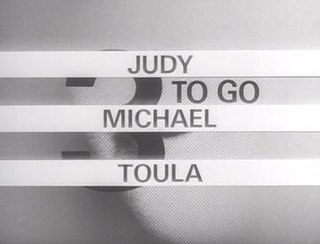
3 to Go is an Australian portmanteau film consisting of three stories, each presenting a young Australian at a moment of decision about their future. The film was first shown on commercial television in March 1971 and episodes screened individually in cinemas as supporting shorts. One of the stories, Michael, written and directed by Peter Weir, went on to receive an Australian Academy of Cinema and Television Arts award.
